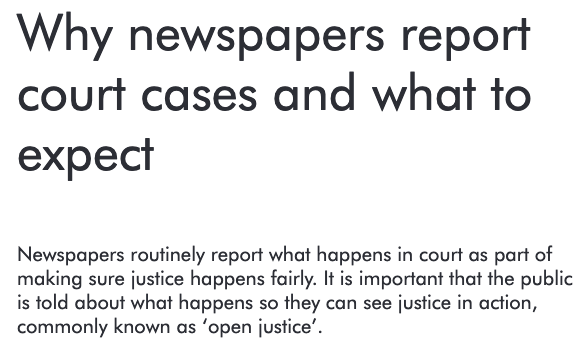 Abraham Lincoln
If given the truth, the people can be depended upon to meet any national crisis...
Abraham Lincoln
If given the truth, the people can be depended upon to meet any national crisis...
 Guildford news...
for Guildford people, brought to you by Guildford reporters - Guildford's own news service
Guildford news...
for Guildford people, brought to you by Guildford reporters - Guildford's own news service
Opinion: We Should Not Pay Lip Service to Open Justice
Published on: 17 Jul, 2022
Updated on: 18 Jul, 2022
By Martin Giles
We are all familiar with the old adage, “Justice must be seen to be done.”
But in Guildford, it is not; court cases are rarely reported and it’s the same in most parts of the country.
Another expression we are familiar with is “…to be heard in open court”. In other words, a court open to the public, where we all have the right, subject to the court’s capacity, to watch the proceedings and make our own judgement on the quality of the justice and whether the proceedings were conducted properly.
Reporting of court cases is important for this openness too. We all rely on the media to inform us and scrutinise. We can’t attend every court case in person, even those we are interested in.

Taken from the IPSO guide to the public – Court reporting:
What to expect. If only we had the resources to “routinely” report court cases.
But sadly, that no longer happens. It might hardly be necessary for courts to go “in camera”, i.e. exclude the public and press, when deliberating on matters of state security or great sensitivity, because no one is watching anyway.
Part of the deterrent against crime should be that if discovered it will become public knowledge and that if a person is proven guilty there will be public shame. But now, how can we know who in our community has been found guilty of what? Maybe through unreliable gossip or social media but not through properly written and edited court reports.
 The anonymity this has given those convicted has become so “normal” that they have begun to consider it a right, it is part of a wider trend. The Dragon has received requests to take down stories of the few court cases we have covered, not because they were inaccurate but simply because we named a convicted culprit.
The anonymity this has given those convicted has become so “normal” that they have begun to consider it a right, it is part of a wider trend. The Dragon has received requests to take down stories of the few court cases we have covered, not because they were inaccurate but simply because we named a convicted culprit.
There have been an increasing number of cases where anonymity has been sought from judges (see the Hold the Front Page story: Court reporters warned to expect ‘deluge’ of paedophile anonymity bids) and an apparent lack of standardisation in how they are considered.
But what is preventing the reporting of more court cases by local media? It is simply resources.
Court reporting is particularly resource intensive, reporters waiting around for cases, which might last for days, even weeks, to be heard. As money has drained out of local journalism there is simply not the manpower to fulfil this important function.
The situation was similar in the coverage of local politics. Recognising this, the BBC has funded the Local Democracy Reporting Service. Its reporters cover local authorities and their reports can be published by all signed-up BBC partner news organisations, like The Dragon.
Some years ago I suggested to the BBC that the scheme be extended to court reporting. Others have suggested the same but it has recently been ruled out by a BBC executive.
The BBC’s director of nations, Rhodri Talfan Davies, appearing before the Digital, Culture, Media and Sport Select Committee’s inquiry into the sustainability of local journalism, said he felt it would be “difficult” for the service to expand into court reporting – a move that has been repeatedly suggested in recent years.
He said there are two issues with the proposal: “One is, is it a public good to see significantly more crime reporting? I remember being beaten over the head as a programme editor back in the 90s for too much crime reporting.
“The second is that actually there are still some viable commercial models in court reporting, through wire agencies and some of the larger publishers. So it’s difficult, I think, to identify a clear-cut area in the same way that local authorities provide one, where the deficit was very clear.” I disagree with Mr Davies. I think a return to the level of crime reporting that was carried out in previous decades in newspapers would be very good thing. And who is deciding the “public good” here? The statement seems to indicate that there is a belief, perhaps shared among some agencies involved, that the anonymity of offenders is advantageous. If that is really the view we should be told.
I disagree with Mr Davies. I think a return to the level of crime reporting that was carried out in previous decades in newspapers would be very good thing. And who is deciding the “public good” here? The statement seems to indicate that there is a belief, perhaps shared among some agencies involved, that the anonymity of offenders is advantageous. If that is really the view we should be told.
As for protecting the existing wire agencies and larger publishers, is that the BBC’s role? I don’t think so but I suspect these organisations might have powerful allies with an interest and some influence over politicians.
Nonetheless, if they were smart, they might suggest that some money be made available, from the BBC or elsewhere, for local media to buy some of the agency reports, something currently we simply can’t afford to do.
Responses to Opinion: We Should Not Pay Lip Service to Open Justice
Leave a Comment Cancel reply
Please see our comments policy. All comments are moderated and may take time to appear. Full names, or at least initial and surname, must be given.
Click on cartoon for Dragon story: Public Asked for Views on SCC’s Proposal for Reduced Speed Limits



Recent Articles
- Guildford Festival Burst with Colour, Culture and Community Spirit
- Conservationists Celebrate Victory As Fast-food Plan At Nature Reserve Is Turned Down
- Incident in High Street – Man Found Unresponsive
- Letter: The Weyside Scheme Is Not Going To Be GBC’s Woking
- Guildford’s First “Bike Bus”
- Notice: Free Bandstand Concerts
- Councillors Hear How the Weyside Urban Village Project Became a Multi-million Risk
- NHS Surrey Issue Heatwave Advice Following Met Office Warning
- Guildford Charity’s Tribute To The Great Stevie Wonder
- Busy First Half of 2025 for Scouting in Guildford


Recent Comments
- S Callanan on Letter: A Simple Footbridge Should Have Been Affordable to Keep Towpath Over Weir Open
- Helen Skinner on Guildford’s First “Bike Bus”
- Tony Harrison on Busy First Half of 2025 for Scouting in Guildford
- John Redpath on Letter: Front-line Police Officers Are Heroes But Admin and Comms Need Improvement
- Angela Richardson on Letter: A Simple Footbridge Should Have Been Affordable to Keep Towpath Over Weir Open
- Jim Allen on Letter: Front-line Police Officers Are Heroes But Admin and Comms Need Improvement
Search in Site
Media Gallery
Dragon Interview: Local Artist Leaves Her Mark At One of England’s Most Historic Buildings
January 21, 2023 / No Comment / Read MoreDragon Interview: Lib Dem Planning Chair: ‘Current Policy Doesn’t Work for Local People’
January 19, 2023 / No Comment / Read MoreA3 Tunnel in Guildford ‘Necessary’ for New Homes, Says Guildford’s MP
January 10, 2023 / No Comment / Read More‘Madness’ for London Road Scheme to Go Ahead Against ‘Huge Opposition’, Says SCC Leader
January 6, 2023 / No Comment / Read MoreCouncillor’s Son Starts Campaign for More Consultation on North Street Plan
December 30, 2022 / No Comment / Read MoreCounty Council Climbs Down Over London Road Works – Further ‘Engagement’ Period Announced
December 14, 2022 / No Comment / Read MoreDragon Interview: GBC Reaction to the Government’s Expected Decision to Relax Housing Targets
December 7, 2022 / No Comment / Read MoreHow Can Our Town Centre Businesses Recover? Watch the Shop Front Debate
May 18, 2020 / No Comment / Read More







Ben Paton
July 18, 2022 at 9:26 am
The reputation of the justice system is low and getting ever lower.
How was it possible for judges falsely to convict hundreds and hundreds (over 750?) of law-abiding decent citizens who were running Post Offices all over the country over years and years?
There was no evidence of theft of money. None. As a person who once qualified as a Chartered Accountant and has looked at some of the cases, I am gob-smacked by the accounting illiteracy of the judges, the dishonesty of the solicitors who brought the charges, and the complete indifference of the whole system – but especially the judges – to the truth and to justice. The judges just did not properly examine the evidence.
And not one person has been held to account. Not one single person.
The Legal Services Board – a self-serving quango – reports that everything is alright in the legal world. Ha!
The smug conceit of lawyers in the UK is that they are responsible for the creation of the “rule of law”. Not true. It is people like the postmasters and the people who reported the injustices and got crowdfunding (Nick Wallis and Computer Weekly) who took action. Not a single regulator or police force thought it worth investigating.
Without reporting, the Post Office and its government shareholder might well have gotten away with (and might yet get away with) daylight robbery of the Post Masters.